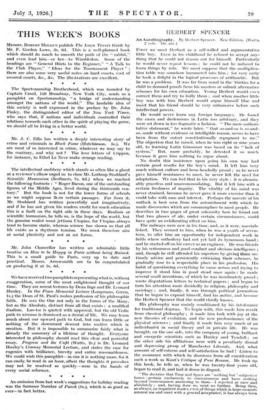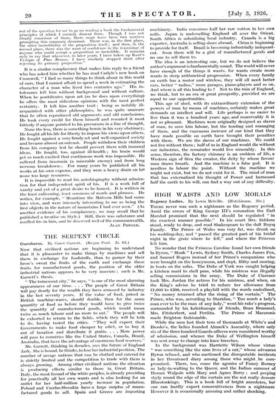FIRST we meet Herbert as a self-willed and argumentative little
boy. Even in his childhood he refused to accept any- thing that he could not reason out for himself. Particularly he would never repeat lessons ; he could not be induced to
learn things by rote. We must suppose that the multiplica- tion table was somehow hammered into him ; for very early he took a delight in the logical processes of arithmetic. But he was a problem. It was far from usual in the 'thirties for child to demand proofs from his masters or submit alternative
schemes for his own education. Young Herbert would even. Correct them and try to bully them ; and when another little boy was with him Herbert would argue himself blue and
insist that his friend should be very submissive before such intellectual powers.
• He would never learn any foreign langimges. He found the cases and declensions in Latin too arbitrary, and they were set down in too dogmatic a fashion. "The mere authori- tative statement," he wrote later, " that so-and-so is so-and- so, made without evidence or intelligible reason, seems to have been from the outset constitutionally repugnant to me." The objection that he raised, when he wits- eight- or nine years old, to learning Latin Grammar was based on its "lack of System." But, more probably, he detested it so much because it gave him nothing to argue about. '
No doubt this insistence upon going his own way had certain good results for the boy's mind. It left him very much without culture and bone-headedly proud ; as he never
gave himself resistances to meet, he never felt the need for adaptation. We can feel that in his very style ; it is abomin- ably graceless and unaccommodating. But it left him with a- Certain freshness of inquiry. The vitality of his Mind was never- strained, because he never gave it more exercise than it Could take with ease and interest. Perhaps the' naivetéof his outlook- is best • seen from the astonishment with which he made discoveries which are commonplace to most people. He describes in two pages of great solemnity how he found out that two glasses of ale, under certain circumstances, could have quite an exhilarating effect on him.
The railways were new in his time, and, as it were, unestab- fished. They seemed to him, when he was a youth of seven- teen, to offer him an opportunity for independent work in fields where orthodoxy had not yet laid its tyrannous hand ; and he started-off on his career as an engineer. He Won friends by his seriousness and good conduct and obvious intelligence ; and, though he still offended his superiors by giving them un- timely _advice and persistently criticizing their schemes, he gradually rose to a respectable place in his profession. His habit of questioning everything he came across and trying to improve it stood him in good stead once again : he made
several small inventions, of which he was inordinately proud ;- wrote disputatious letters to technical papers ; and began 'to turn his attention more decidedly to religion, philosophy and sociology ; and, .finally, it was through political journalism
that he began to expand himself, find his métier, and become
the Herbert Spencer that the world chiefly knows. - His philosophy was mainly conditioned by his intolerance for traditional dogmas. To begin with; this made him revolt from classieal philosophy ; it made him look with joy at the new theories of evolution, and the new predominance of the physical sciences ; and finally it made him very much of an'
individualist in social theory and in private life. He was brought, on the one side, into the company of young, brilliant and energetic scientists such as Huxley and -Tyndall ; on
the other side his affiliations were with a peculiarly dismal. and depressing group of Manchester Liberals. And, what
amount of self-esteem and self-satisfaction he had ! Listen to the assurance with which he dismisses from all consideration. such a work as Kant's Critique of Pure Reason. He took- rip this book, he tells us, when he was twenty-four years old,' began to read it, and laid it down in disgust.- -
" The doctrine that Time and 'Space are 'nothing but' subjective' forms—pertain exclusively to consciousness and have nothing beyond consciousness answering to them—I rejected at once And, absolutely ; 'and, having done so, went no further. Being then, an always, an impatient reader, even of things Which in large ineaao: interest me and meet With a generanteceptance; it has 'always been-
out of the question for me to go on reading a book the fundamental principles of which I entirely dissent from. Though I was not clearly conscious of them, there must have been two motives prompting this summary dismissal. There was, in the first place, the utter incredibility of the proposition itself ; and then, in the second place, there was the want of confidence in the reasonings of anyone who could accept a proposition so incredible. It remains only to say that whenever, in later years, I have taken up Kant's Critique of Pure Reason, I have similarly stopped short after rejecting its primary proposition."
It is a similar complacency that makes him reply to a friend who has asked him whether he has read Carlyle's new book on Cromwell, "I find so many things to think about in this world of ours, that I cannot afford to spend a week in estimating the character of a man who lived two centuries ago." His in- tolerance left him without background and without culture. When he pontificates upon art (as he does upon everything) he offers the most ridiculous opinions with the most perfect certainty. It left him another trait : being so notably ill- acquainted with other philosophies, he was quite unaware that he often reproduced old arguments and old conclusions. He took every credit for them himself and resented it most bitterly if anyone pointed to his precursors in a line of thought.
None the less, there is something heroic in his very obstinacy. He fought all his life for liberty to impose his views upon others, He fought against a very firmly set and well-organized society and became almost an outcast. People withdrew their children from his company lest he should pervert them with immoral ideas. He fought, too, against ill-health ; his brain would get so much excited that continuous work was impossible. He suffered from insomnia (a miserable enemy) and from long nervous breakdowns. For many years he published all his works at his own expense, and they were a heavy drain on his none too large resources.
It is impossible to read his autobiography without admira- tion for that independent spirit of his. It is a work full of vanity and yet of a great desire to be honest. It is written in the least enlivening, least sensuous of words and phrases. He writes, for example, "Meantime the Malvern Hills had come into view, and were intensely interesting to me as being the first objects in the nature of mountains I had ever seen." (As another evidence of his complacency, we may recall that he published a treatise on Style.) Still, there was substance and muffled fire in him, and he deserved well of the commonwealth.
ALAN PORTER.











































 Previous page
Previous page